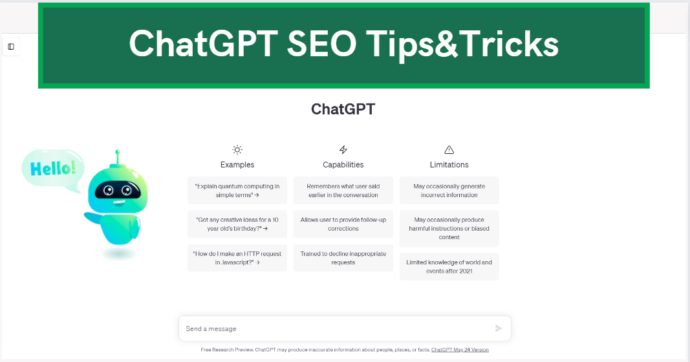- What is ChatGPT and why is it important?
- Keyword research with ChatGPT
- Search engine optimization with ChatGPT
- Conclusion
To effectively leverage ChatGPT SEO, it’s essential to grasp its capabilities and limitations.
If you’re familiar with ChatGPT, you’re likely aware of its growing popularity as a content generation tool capable of improving website content and ranking higher in search engines.
While ChatGPT doesn’t currently offer comprehensive keyword research, it serves as a powerful resource for content brainstorming.
When used correctly, ChatGPT can be a great tool for creating high-quality content that boosts your website’s rankings.
Not to mention it seamlessly integrates with WordPress and helps your website fit for Google Search Console metrics.
In this article, we present an informative and concise overview of taking advantage of ChatGPT for SEO.
We’ll explore its limitations while highlighting its potential benefits in terms of search engine rankings.
Let’s dive in!
What is ChatGPT?
ChatGPT-3, an acronym for “Generative Pretrained Transformer 3,” stands as a remarkable AI chatbot that emulates authentic human conversations, retrieves information from the web, sparks creativity, shares humor, and more.
Since its launch in November 2022, the advantages of ChatGPT have reverberated across the globe, prompting Microsoft to swiftly invest a staggering $10 billion into OpenAI, recognizing its immense potential.
ChatGPT has garnered immense attention, owed partly to its captivating AI technology, but primarily due to its exceptional product offering.
Seamlessly blending the conversational interface of a chatbot with the capabilities of artificial intelligence, ChatGPT delivers an extraordinary user experience.
With a multitude of applications, it is smart to use ChatGPT for SEO in your content marketing strategies.
Some benefits of ChatGPT for WordPress users:
- Content generation
- SEO
- eCommerce assistance
- Customer support
- Website customization
- Technical troubleshooting
- Feature expansion
ChatGPT for keyword research
Currently, most versions of ChatGPT don’t have direct access to the internet to gather up-to-date information.
As a result, the responses you receive when querying ChatGPT are based on older data.
Some users have access to ChatGPT plugins that can fetch recent information, and there are also third-party tools that connect ChatGPT to the web through its API.
However, in most cases, the data you receive is limited to what the specific version of ChatGPT can provide.
This limitation affects the usefulness of ChatGPT for tasks like keyword research, search trend analysis, and understanding search intent.
If you rely on ChatGPT for keyword research, it’s likely that the data you receive is not accurate:
Modern keyword research tools offer a wide range of information, such as current search volumes and competition levels of the search engine.
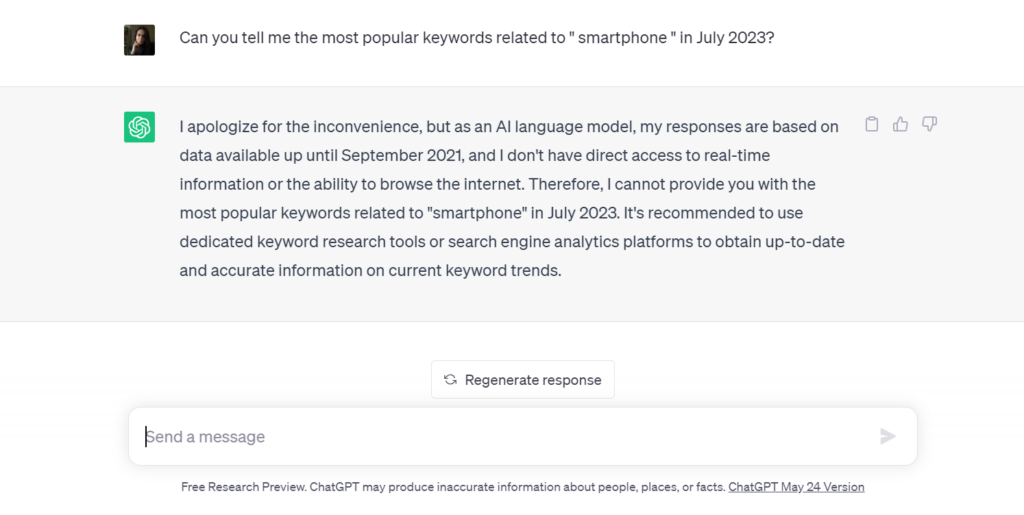
This data is crucial for developing an effective content strategy, but it’s not something that ChatGPT can provide at the moment.
Search engine optimization with ChatGPT
After exploring the limitations of using ChatGPT for SEO, let’s now focus on the practical applications and possibilities it offers.
Create content clusters
Content clusters are groups of articles that are interconnected and delve deeper into a specific topic.
For instance, if you browse through our blog, you’ll notice various clusters such as hosting reviews, WordPress technical tutorials, and email marketing guides.
Creating content clusters can be beneficial as they allow you to provide relevant information to your audience.
Each cluster addresses a question or concern your users may have, and within each cluster, you offer content that provides answers and solutions.
Now, the question arises: How do you determine which clusters to focus on?
If you’re familiar with your niche, you likely have an idea of what interests people.
However, if you want to be more comprehensive, you can analyze competitor websites, research popular searches within your niche, analyze keywords, and more.
ChatGPT can assist you in this process by narrowing down potential content clusters for your niche.
It’s important to view these suggestions as a starting point for brainstorming.
Additionally, you should consider topics that genuinely captivate your audience and have the potential to improve your search rankings.
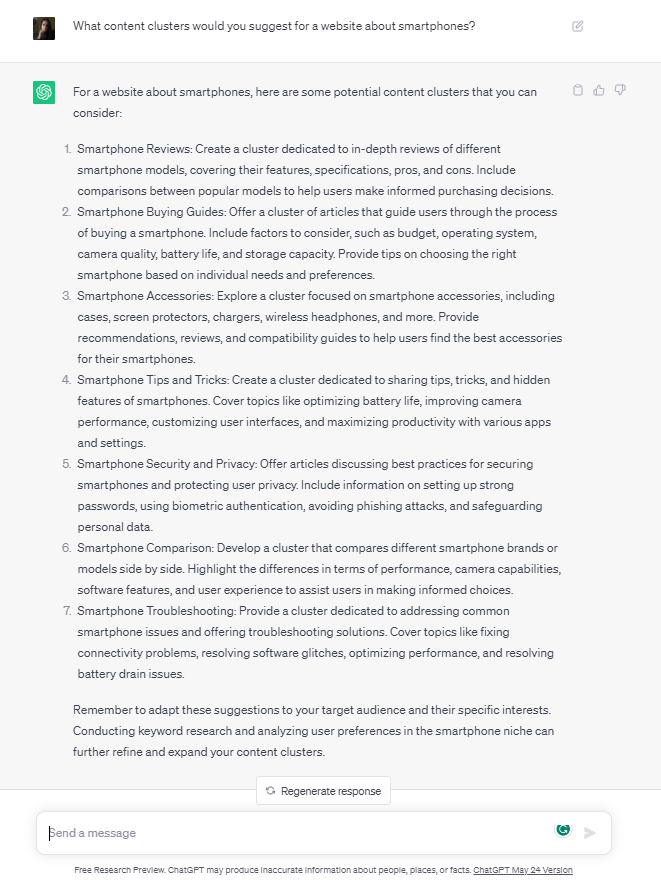
For instance, if your web page is about smartphones, you can evaluate the AI-generated content clusters proposed by ChatGPT and determine which ones are feasible and relevant.
Relying solely on the tool’s suggestions may lead you to focus on topics that either don’t resonate with your audience or face intense competition.
Ask for related keywords for your target keywords
To enhance your content marketing strategy and find new directions for your business, you can leverage ChatGPT’s capabilities to generate relevant keywords.
For instance, if you’re a restaurant owner in Los Angeles looking to increase visibility, you can ask ChatGPT for related keywords to “Italian restaurant in Los Angeles.”
By doing so, ChatGPT can provide you with a list of similar keyword ideas that may broaden your perspective.
For example, if you ask about keywords for restaurants in Los Angeles, ChatGPT might suggest exploring options like best restaurants, vegan restaurants, or romantic restaurants.
This prompts you to consider serving these variations to cater to different preferences in your community, potentially opening up new opportunities and search volume to optimize for.
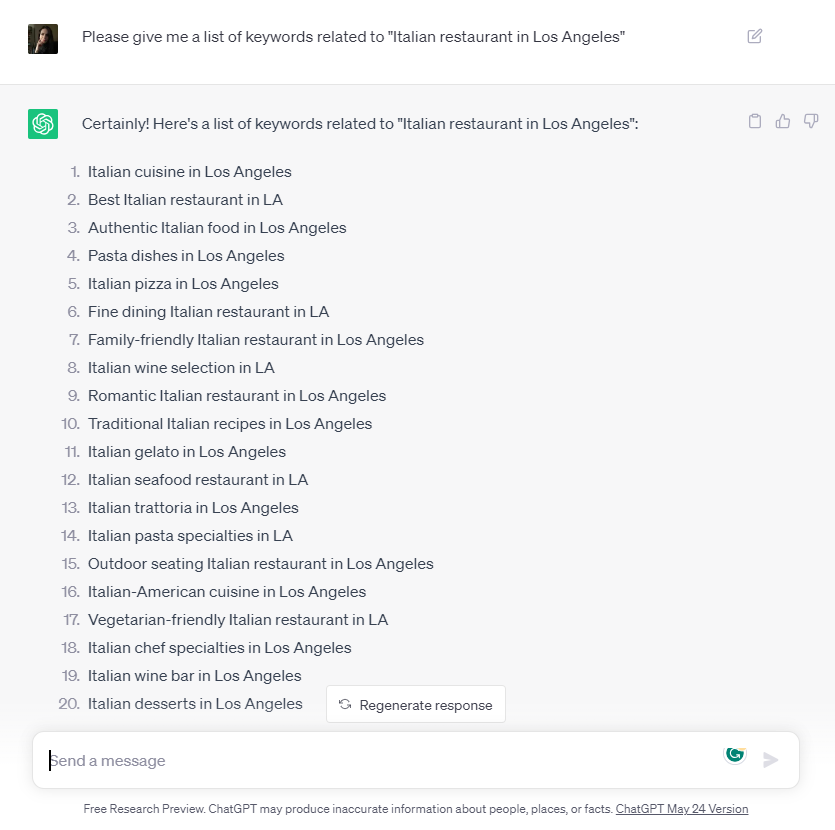
It’s important to note that ChatGPT’s suggestions are meant to spark inspiration and take your SEO strategy in new directions.
You still need to evaluate and select the terms that align with your overall business strategy and target customers.
ChatGPT cannot handle all the work for you, but it can provide valuable prompts for building unique and engaging content.
These prompts from ChatGPT can serve as great inspiration for developing more distinctive and relevant content for your website and improving your overall SEO strategy.
Build content around these topics
The use of AI to create content is a topic of ongoing discussion.
Many websites are already using ChatGPT for SEO to generate content and articles.
So, the question arises: Should you consider using it too?
With ChatGPT, you can provide a topic idea and a keyword, and it will generate a blog post on that subject.
In some cases, it may even produce a satisfactory result.
However, it’s important to note that ChatGPT is not yet at a level where it can replace an expert in a specific field or niche.
You don’t have to solely rely on our opinion – ChatGPT itself agrees.

At its current stage, ChatGPT can occasionally provide incorrect information or offer generic responses.
However, it can still be valuable for generating rough drafts and outlines for your posts.
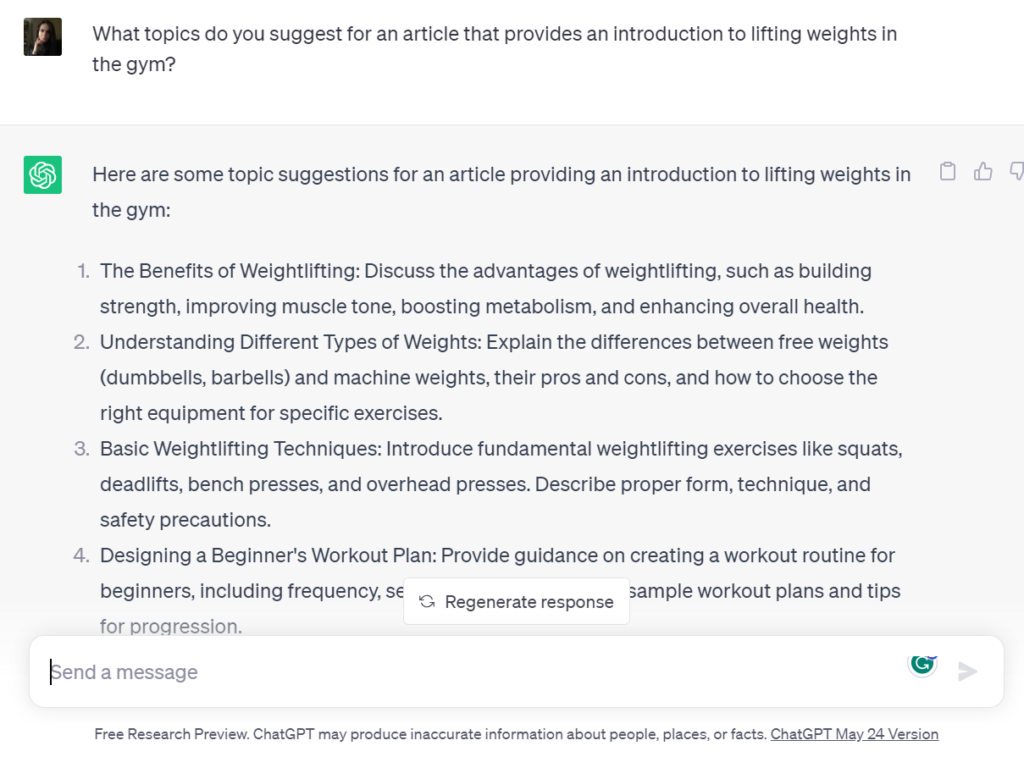
This feature can be immensely helpful for brainstorming content ideas.
You can utilize keyword research tools to identify what people are searching for regarding the topic you want to write about.
By combining this information with ChatGPT’s suggestions, you can create a comprehensive article catering to search intent and the interests of your target audience.
Help with formatting the content
One interesting way to utilize ChatGPT for SEO is by providing it with information and asking it to interact with it, rather than relying solely on its built-in knowledge.
For instance, you can give ChatGPT a poorly formatted paragraph and request it to return a table or a list, making the content more easily understandable.
To demonstrate the effectiveness of this approach, we experimented by asking ChatGPT to create a table comparing .co and .com domains.
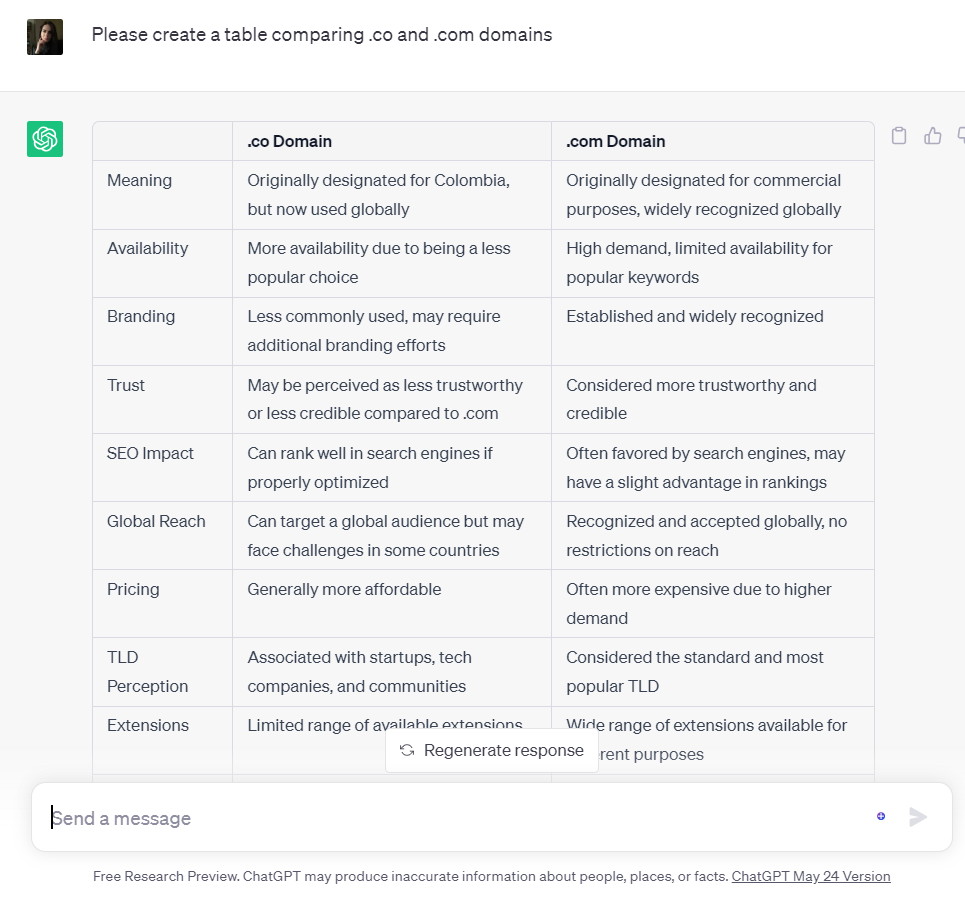
ChatGPT selected the differences to highlight, formatted them, and extracted the information directly to create the table.
While we could have done this manually, ChatGPT saved us time and provided a helpful starting point.
You can employ a similar technique to improve formatting in various ways.
For instance, you can ask ChatGPT to generate a Frequently Asked Questions (FAQ) section based on an article or to divide lengthy paragraphs with distinct subheadings.
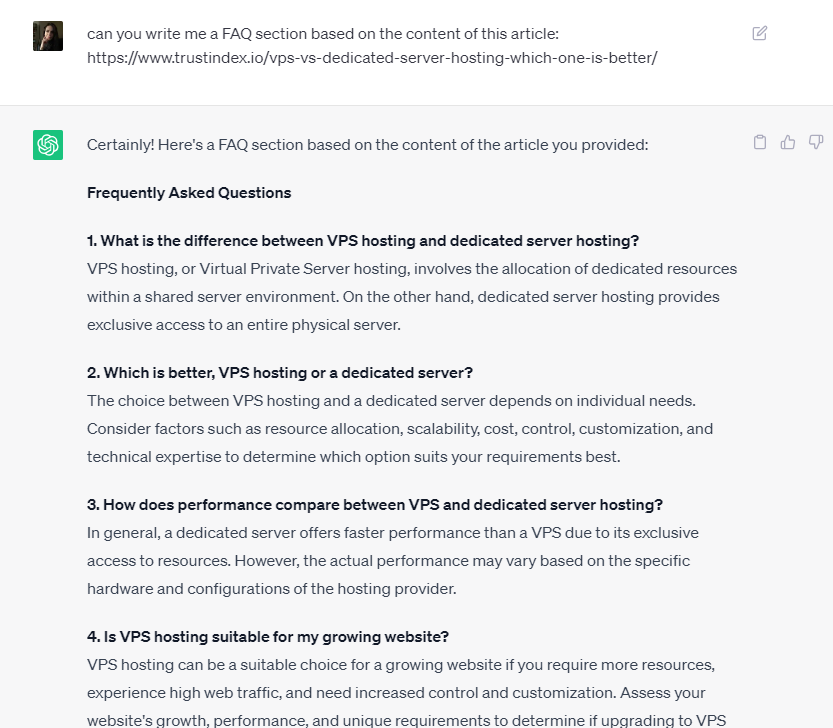
Remember, it’s crucial to understand that you need to feed ChatGPT the specific information you want it to use.
Don’t hesitate to include ample details in the query box. Users have reported that ChatGPT can handle requests with up to approximately 500 words without difficulty [1].
Generate meta descriptions and meta title ideas
Creating titles and meta descriptions for your blog can be a challenge, but with ChatGPT, you have another powerful SEO tool at your disposal.
For instance, let’s say you’re writing an article on tips for starting a gluten-free diet.
By asking ChatGPT for title ideas, you can generate attention-grabbing headlines that resonate with your audience.
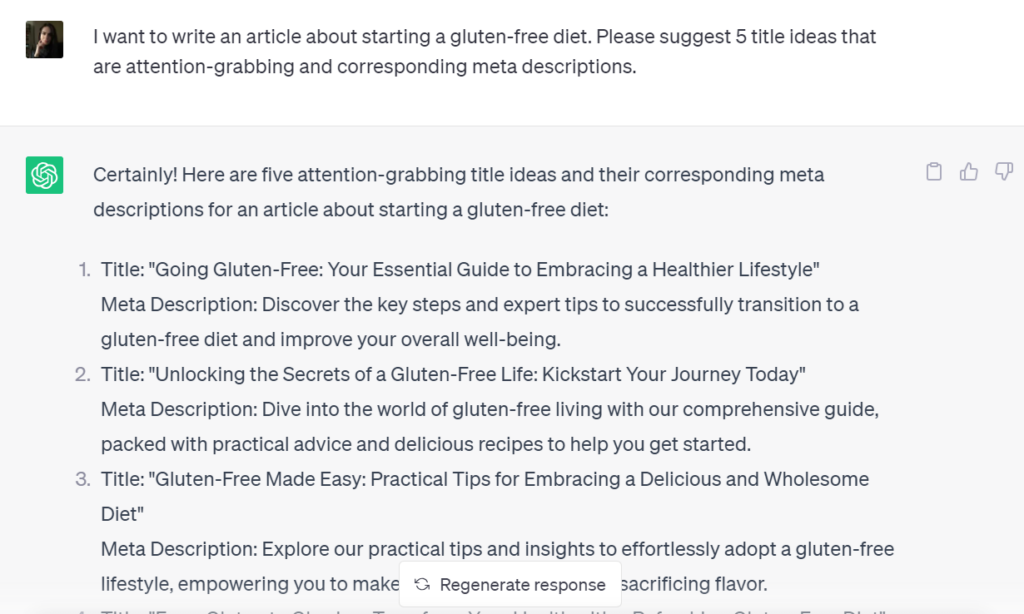
Providing detailed ChatGPT prompts yields better results.
For example, requesting snappy headlines can result in a list of engaging titles.
You can explore numerous ideas effortlessly, whether you need one or dozens of options.
As you analyze your site’s analytics and discover the pages receiving the most clicks in search results, you can refine your post titles based on this valuable information.
With ChatGPT, you have the opportunity to optimize your blog’s title and meta description for better clickthrough rates and improved SEO performance.
Grammatical errors and spelling checks
This method is one of my personal favorites.
Once you’ve finished writing your content, simply paste it into ChatGPT to identify and fix any spelling or grammatical errors that may be present.
I followed ChatGPT’s suggestion and expanded on the advantages of VPS hosting service.
ChatGPT effortlessly corrected my clumsy typing.

It’s a simple, effective, and very useful tool.
In fact, it took ChatGPT just five days to reach one million users.
Additionally, some individuals utilize ChatGPT to transform their copy into various standard writing styles, such as Chicago or MLA format.
Technical ChatGPT SEO Prompts
While creating SEO-friendly content is essential, addressing technical issues is equally crucial.
Ensure you’re on the right track by utilizing ChatGPT prompts for technical SEO when you need extra assistance.
- Implement the FAQs Page Schema markup for the provided questions and answers.
- Generate hreflang tags for pages targeted to specific countries and languages, including [country] in [language], [country] in [language], and [country] in [language].
- Create .htaccess rewrite rules to 301-redirect [source location] to [location destination].
- Generate robots.txt rules to block crawling of [location to block] while allowing crawling of [location to crawl] within the domain.
- Create a valid XML sitemap containing the listed URLs.
- Set up a no-follow and canonical tag for [URL].
Act as an SEO specialist, analyze [website URL], and provide improvement suggestions for technical SEO.
Present the recommended improvements in a table format, including actionable steps to enhance the website’s technical aspects.
Conclusion
AI tools like ChatGPT are already revolutionizing AI content creation for the web.
However, it’s crucial to understand their usage for SEO, their functionality, and their limitations.
Currently, obtaining up-to-date information from ChatGPT may be challenging, so we recommend not relying on it for keyword research.
Nevertheless, there are several other valuable ways to leverage ChatGPT for SEO, including:
- Planning content clusters
- Generating seed keywords for each cluster
- Assisting in content creation
- Enhancing content formatting
- Providing title options and meta descriptions
- Correcting grammatical errors
Frequently Asked Questions
ChatGPT can be a useful tool for SEO.
It can assist in generating content ideas, improving copywriting, optimizing meta descriptions, and providing guidance for content clusters.
However, it’s important to note that ChatGPT is just one tool in the SEO toolkit and should be used in conjunction with other SEO strategies and practices.
ChatGPT can positively impact SEO by helping with various aspects of content creation and optimization.
It can generate relevant and engaging content, provide keyword research suggestions, improve content formatting, and assist in creating effective titles and meta descriptions.
No doubt, that using ChatGPT effectively can contribute to better SEO performance.
SEO traffic is when people visit a website by finding it through search engines like Google or Bing.
They search using keywords, and the search engine shows them websites that match.
If a website ranks high on the search results, it gets more SEO traffic.
ChatGPT cannot replace SEO entirely.
While ChatGPT can assist in certain aspects of SEO, such as generating content and optimizing copy, it does not encompass the entire range of SEO practices and strategies.
SEO involves various techniques, including keyword research, on-page optimization, technical optimization, link building, and user experience improvements.
